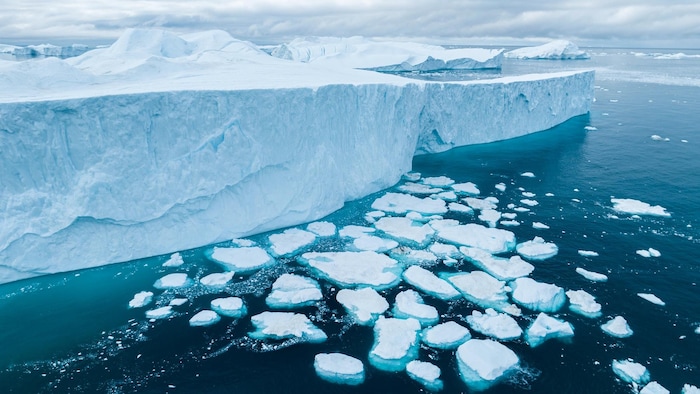Open in full screen mode Pieces of ice float in the Arctic. Agence France-Presse Speech synthesis, based on artificial intelligence, makes it possible to generate spoken text from written text. The summer of 2023 was the hottest on record in the Arctic, according to a benchmark report published Tuesday, which paints an alarming picture of this region of the world, particularly subject to the effects of global warming. This annual document, published by the American Atmospheric and Oceanic Agency (NOAA), highlights in particular the scale of the record fires that hit Canada during the summer, and the melting of the Greenland ice sheet continues. Last year (October 2022 to September 2023) was the sixth warmest since 1900 in the Arctic. But summer (July to September) broke a record there, with an average temperature of 6.4°C. The overarching message of this year's report is that it's time to act. A quote from Rick Spinrad, the head of NOAA As a nation and a global community, we must significantly reduce the greenhouse gas emissions that are driving these changes, he added. At the same time in Dubai, the negotiations for COP28, the annual United Nations climate conference, were facing blockage from certain oil-producing countries to include in a final agreement text , a goal of exiting fossil fuels. Loading ELSE ON NEWS: COP28: the UAE presidency proposes a historic compromise on fossil fuels Overall, the year 2023 will be the hottest in history, the European Copernicus service has already predicted. But the Arctic, a region that includes the North Pole, is affected by a phenomenon called amplification, which means that it is warming faster than the mid-latitudes. This mechanism is due to many factors, such as the loss of snow cover and sea ice, or even the warming of the oceans, explained an expert during a press conference. In total, more than 80 experts from 13 countries contributed to this report, published annually for 18 years. They focused on the changes regarding precipitation, which was higher than normal on average, but with significant regional differences within the Arctic. Thus, the summer was abnormally dry in the north of the American continent, fueling the devastating fires observed in Canada. These caused the evacuation of several tens of thousands of people, and intense atmospheric pollution. Conversely, In Scandinavia, extreme rainfall caused significant flooding. Heavy precipitation was also seen in parts of Alaska during the winter. The report is therefore clear: the Arctic is generally becoming wetter. When the atmosphere and oceans warm, there is more of water vapor in the air, and storms come. A quote from Rick Thoman, University of Alaska Fairbanks. Concerning Greenland, despite an above-average snow accumulation during the winter, the mass of the ice sheet continued to decrease, as it has since 1998. The report notes that a station at the highest point of the ice sheet recorded a record temperature of 0.4°C on June 26, 2023, experiencing only the fifth melt times since his observations began 34 years ago. The melting of Greenland is contributing to sea level rise, and thus has repercussions well beyond the Arctic. Its collapse would be catastrophic, particularly for coastal communities. The report also contains a section dedicated to the question of salmon populations, very important for the x27;ecosystem and human activities. Another chapter is devoted to the melting of underwater permafrost, so far little studied. As inhabitants of the #x27;Arctic, we live with these changes every day, and we have no choice but to deal with what is happening and adapt, said scientist Rick Thoman , while calling for global solutions. And to add, with an emotional voice: Listen to the elders. This change has been happening for decades.
COP28: the UAE presidency proposes a historic compromise on fossil fuels
The Arctic summer of 2023 was the hottest on record

